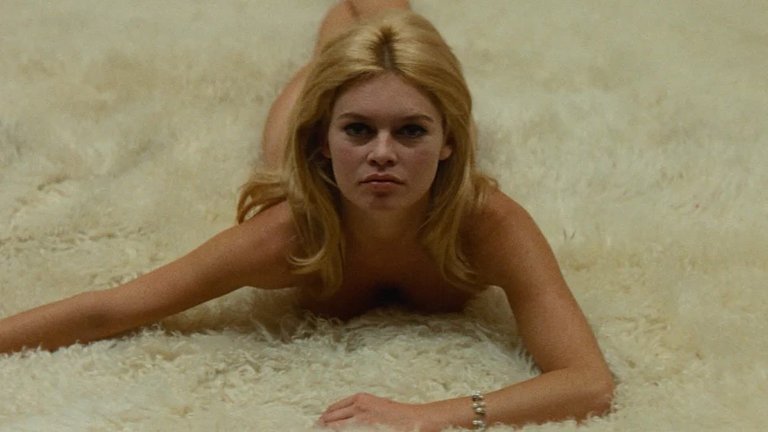
Certain films are often remembered primarily for their soundtracks, a testament to the composers' skill but also an indication that the music may overshadow other cinematic elements. This phenomenon is notably evident in Contempt (Le Mépris), the 1963 drama directed by Jean-Luc Godard. While frequently hailed as one of the most significant yet atypical works of the French New Wave, its soundtrack, composed by Georges Delerue, has garnered greater acclaim.
Contempt is adapted from the 1954 novel A Ghost at Noon by Alberto Moravia, a distinguished Italian author known, among other things, for novels adapted into several acclaimed films throughout the mid-20th century, with The Conformist being one of the most notable adaptations.
The nominal protagonist, Paul Javal, portrayed by Michel Piccoli, is a French playwright residing in Rome with his alluring wife and former typist Camille, played by Brigitte Bardot. Paul has achieved commercial success but is tempted by an offer from American film producer Jerry Prokosch, played by Jack Palance, to rewrite a film script based on Homer’s Odyssey. The film is directed by the illustrious director Fritz Lang, who appears as himself. However, Prokosch's insistence on altering Lang's original script places Paul in a morally ambiguous position. His marriage begins to unravel after Camille meets Prokosch, whose lecherous advances and Paul's passive acceptance of producer’s behaviour make Camille feel betrayed, so she declares to Paul that she doesn’t love him any more. Despite their marital strife, they accept Prokosch's invitation to Capri for the film shoot.
What stands out in Contempt is its seemingly conventional style when juxtaposed with earlier French New Wave films or typical 1960s arthouse cinema. The film employs vibrant colour and Cinemascope widescreen format, which lend it an appearance akin to mainstream big-budget dramas of the time. This stylistic choice can be attributed to the involvement of legendary Italian producer Carlo Ponti, who sought to elevate the film's commercial appeal while maintaining its artistic integrity.
In contrast to Godard’s earlier work in Breathless, where jump cuts and innovative editing techniques were prevalent, Contempt features a more subdued approach. The use of jump cuts appears almost as an afterthought; even the opening credits that are delivered through voiceover rather than traditional text on screen look like an element seemingly included to assert its French New Wave credentials. The film predominantly relies on long tracking shots that are visually stunning, particularly in its latter segments set against the backdrop of Capri and featuring Casa Malaparte, an architectural marvel of the 20th century.The film's visual allure is further amplified by plenty of scenes in which Bardot, actress celebrated as one of cinema’s greatest sex symbols during the 1960s, appears in the nude and shows her famous posterior.
For cinephiles, Contempt offers a rich tapestry of references to iconic films and revered filmmakers. Godard pays homage to Fritz Lang not only by casting him as a character but also by allowing him to critique the cinematic process itself. The film serves as a meta-commentary on the state of commercial cinema in the 1960s, particularly critiquing the popular "sword and sandal" epics that dominated box offices at that time. Jack Palance’s portrayal of the crude producer appears to be the reference to Rod Steiger’s character that plagued Palance’s character in the The Big Knife few years earlier.
However, the film's soundtrack, composed by Georges Delerue, is perhaps the most problematic aspect of Contempt. While Camille's Theme is undoubtedly one of the most recognizable and beloved pieces of music in cinema history, its use in the film is often excessive, creating unnecessary melodrama and drowning out the plot, dialogue, and characters. This is ironic, given that the theme has been used in countless commercials and was even recycled by Martin Scorsese in his 1995 masterpiece, Casino. Nevertheless, in the context of Contempt, the theme often feels like a crutch, relied upon too heavily to create emotional resonance rather than allowing the narrative to speak for itself.
Initially benefiting from Godard’s reputation as a New Wave innovator, Contempt achieved commercial success largely due to Bardot’s star power—her performance eclipsing Piccoli’s more subdued portrayal of Paul Javal. Critics have hailed Contempt as a grand cinematic achievement of the 1960s; however, such praise often comes from an arthouse perspective that may overlook its shortcomings in narrative engagement.
Among dedicated Godard enthusiasts, Contempt is often regarded as his most commercially viable film; however, Godard himself viewed it as an experimental venture that he did not wish to replicate. While accessible to viewers unfamiliar with avant-garde cinema, those who approach it with high expectations may find themselves disappointed by its perceived pretentiousness.
RATING: 5/10 (++)
Blog in Croatian https://draxblog.com
Blog in English https://draxreview.wordpress.com/
InLeo blog https://inleo.io/@drax.leo
Hiveonboard: https://hiveonboard.com?ref=drax
InLeo: https://inleo.io/signup?referral=drax.leo
Rising Star game: https://www.risingstargame.com?referrer=drax
1Inch: https://1inch.exchange/#/r/0x83823d8CCB74F828148258BB4457642124b1328e
BTC donations: 1EWxiMiP6iiG9rger3NuUSd6HByaxQWafG
ETH donations: 0xB305F144323b99e6f8b1d66f5D7DE78B498C32A7
BCH donations: qpvxw0jax79lhmvlgcldkzpqanf03r9cjv8y6gtmk9